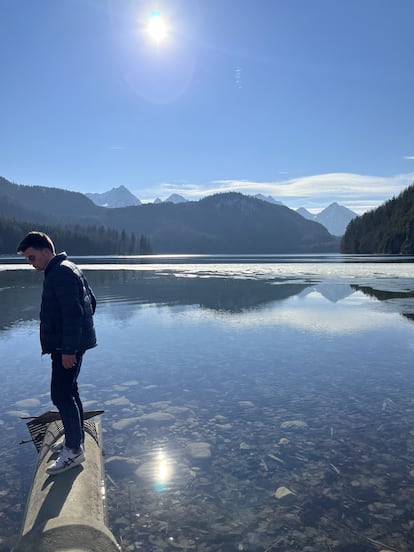Why we are having less sex: ‘Between TV series, work and Pornhub, I can’t be bothered’
Data and experts indicate that each generation is engaging in fewer sexual relationships than the previous one due to a variety of reasons from technology to job insecurity, housing, and feminism

Born at the start of 1990, Mariana has landed her dream job and she sleeps like a log, despite feeling slightly stressed from time to time. From Monday to Thursday she plays sports, Fridays and Saturdays she goes out with friends, Sunday is reserved for family, there might be a movie on Wednesdays and, every now and again, there’s sex.
“Very, very occasionally,” she says. “There are weeks when I don’t even think about it. Between getting home and watching a series, my work schedule, Pornhub and what I come across on Tinder — I can’t be bothered. I prefer to deal with it alone. There’s not much sex with anyone else.”
What Mariana doesn’t realize is that she’s one of many.
Whether someone is getting too much of something or too little depends on multiple variables — at the very least on what that something is and who is measuring it. If that something is sex, it is even more subjective. What is not subjective is that people are having less and less of it — less sex in general, and with each generation that comes along. With or without a partner. “It’s been happening for the past four decades,” notes José Díaz, the president of the Spanish Association of Clinical Sexology (AESC). Eusebio Rubio-Aurioles, former president of the World Association for Sexual Health (WAS) and now advisor to WAS, adds that the phenomenon is specific to “what is understood by the West, where the economy has been changing, as has the traditional structure of society and family.” The same thing is not happening in Asia, Africa or Latin America. “The realities are different, and the quality and quantity of information is unbalanced. No funds are dedicated to this costly research,” he adds.
Where studies are carried out, there “is a clear trend.” And it has been more pronounced since 2010. Or at least more visible. But, as the WAS advisor points out, it is “difficult to respond with academic rigor.”
There are a range of possible explanations given by specialists, most of which overlap: precarious working conditions or longer working hours, stress and depression, and increasingly less stable relationships or confusion, especially among young people, exacerbated by the growing sexual freedom enjoyed by women.
Although the trend seems clear, an accurate picture is more complicated, particularly since there are no regular follow-up studies. According to Díaz, the U.S. has carried out just two longitudinal studies over 20 years.
The result of the first study showed that Americans had sex nine times less per year in the early 2010s than in the late 1990s: on average, they went from having 62 sexual relations per year to 53. The second study showed sexual frequency between 2000 and 2018, when sexual inactivity increased among young men and women up to age 34, but especially between 18 and 24, and mainly among singles. The same declines were seen in Germany, between 2005 and 2016; in Finland, between the late 1990s and the mid-2000s; and in Australia, between 2001 and 2013.

The third part of the Center for Social Research’s (CIS) survey on social and emotional relationships during the pandemic offers a snapshot of what is happening in Spain. The question posed was: which situation best describes your sentimental and sexual situation? The survey found that 17% “do not maintain any type of sentimental or sexual relationship” while 5.5% have “an intimate relationship without sexual relations.” Moreover, after the pandemic, frequency of sex had increased for 8%, and fallen for 16%.
In her 30s, Sara and her partner’s sex life nosedived: “In January 2022 we began to argue a lot, to put on weight, and be less comfortable with our bodies,” she says, adding that she got depressed.
Roser, 33, who had no stable relationship, encountered a different set of obstacles. “I live in Barcelona and have to share an apartment,” she says. “Sometimes I think more about disturbing the person on the other side of the wall than about my own pleasure. There are a lot of people about, but it’s hard to enjoy it, to hook up, to get enough satisfaction from it to want to do it again.” Regarding apps, she adds, “It’s pretty crazy. You can talk to a lot of people, but then you have to make it concrete. It makes you dizzy and I get to the point when I decide not to devote any more energy to that person. When I do devote more time, it’s almost never that much. I sometimes think, what’s the point?”
According to the National Institute of Statistics (INE), there are more than half a million shared flats and apartments in Spain. This, coupled with job insecurity, especially among young people, has had an impact on their sex lives, as does “any element of stress,” according to Díaz. “Stress is not an abstract concept,” he explains. “It produces hormonal changes that, among other things, generate high levels of cortisol and prolactin, two hormones that in turn decrease the level of testosterone, which is the hormone of desire, in both men and women. Chronic stress produces a decrease in desire.”
Anxiety and depression also play a significant role in undermining the libido. The Headway Mental Health 2022 report ranked Spain as the country with the second-highest number of mental health disorders in Europe, behind only Portugal. This affects mostly women, and increasingly adolescents. But these disorders are not confined to the Iberian Peninsula. More than 320 million people suffer from depression globally, 18% more than a decade ago.
Brenda, 27, a resident of Mexico City, is among them. She had to go back to her parents’ home and attributes her dwindling sex life to depression and medication: “Sertraline and, later, fluoxetine,” she says. “What struck me is that my individual sexual activity also decreased. I used to enjoy touching myself a lot, now I don’t feel anything.”

Anxiety and depression “are enemies of desire and enjoyment regarding sex,” says Díaz. “One of the symptoms of depression is the lack of desire, not just sexual but generally.” He explains that not all antidepressants reduce sex drive. While selective serotonin reuptake inhibitors do, there are others that “clearly stimulate it.” Experts also flag up masturbation and porn, as factors responsible for the decline in sexual relations.
The Nacho Vidal complex
Antoni Bolinches, clinical psychologist and author of Wise Sex, links the decrease in the frequency of sexual relations to two variables: “One is our stressful and complex work life.” Andrés, 34, is a prime example: “I get home around 10 p.m., so exhausted and with so many things on my mind that I barely have enough energy left to eat dinner.” Then there’s Nuria, 34, who has no partner, but rotates morning, afternoon, night and weekend shifts, which makes it difficult to coincide.
The other factor is men’s fear they won’t be able to perform. This fear is linked to two other issues. “The Nacho Vidal complex, triggered by the comparative affront of the erect penises in pornography,” and the change of roles between men and women “that has occurred over two generations,” involving the gradual disappearance “of the demanding man and the accepting woman,” says Bolinches.
“The freer the woman shows herself to be, the more men fear her,” he adds, thus producing the paradox that “the more sexual freedom, the more refuge in an autonomous and masturbatory sexuality.” Of the stories that reached EL PAÍS for this report, many made specific allusion to Bolinches’ point.
“They either tell me clearly or I lay off,” says Mau, 23. “I don’t know if it’s fear of rejection, of going over the line she has set or what.”
Meanwhile, Marcus, 33, says, “Now we ask questions that we didn’t ask before, and we often become self-conscious and censor ourselves. Flirting used to be an act of conquest by the man and surrender by the woman. Now it is much more horizontal, in the case of heterosexual relations.”
“Sometimes people are afraid to even get close,” says Claudia, 25. “But it’s easy to see when there is interest, right? What I do think is that there are things girls used to let go and now we don’t. Sexist jokes? Out. Racist bullshit? Out.” Claudia adds that these are just two of many things she will not put up with and it is difficult to find someone who won’t come out with something on the list. Nuria, the individual on the rotating shifts, believes women are less prepared to put up with stuff they don’t feel comfortable with. “We have raised the bar a lot,” she says. “We know what we want and what we don’t want. It used to be that you more or less put up and shut up but nowadays it’s more like, ‘I make my demands and if you don’t meet them, next.’”
Susana is in her 50s and holds a similar view. “I’m already old and I don’t come across anyone worthwhile,” she says. “My life is also very home-based. I work from home and it’s difficult to meet people. In the past, 80% of my relationships were sexually quite mediocre, bordering on bad. A snog, a fondle, and stick it in. Oral sex was scarce and when it happened it was generally bad. Guys are very influenced by porn, very phallic. I can’t be bothered anymore. It exhausts me. It pisses me off.”

Sporadic nature of relationships
Díaz points out that in these phallocentric situations the relationship is not between two people “but between two sets of genitals” and that this “impoverishes our quality of life.” Mariona Gabarra has been aware of this trend for the past eight years. She is a sexologist, and her theory is based on the sporadic nature of relationships, with the accompanying difficulty in maintaining “stable ties” that sociologist Eva Illouz flags up in her theory about the end of love.
Gabarra, who is also a consultant for Gleeden, a female platform dedicated to non-monogamous encounters, knows more and more young people in their 20s with sexual issues. In men, it’s erectile dysfunction or premature ejaculation. This is where expectations affect performance. It’s where “porn comes in, which is not bad in itself, but is bad as a substitute for sex education.”
“The upcoming generations are not grasping the fact that even if a relationship is sporadic, it is a relationship,” Gabarra adds. “If there is no complicity, chemistry or connection, there comes a time when sex doesn’t bring you anything. They have more freedom as many prejudices have disappeared, but they don’t enjoy sex, and they tell you so. They end up thinking that it’s not worth their time or effort to engage in that kind of relationship.” Jaime, 27, for example, says confinement has made him “used to” being alone. From a small village in Asturias in the north of Spain, he says he finds it much more effort than before to try to start something with someone and he is not always willing.

Meanwhile, Eusebio Rubio-Aurioles, of WAS, believes that the evolution of the Western world, which is increasingly individualized and where everything is postponed, is having a huge impact on the way we relate to each other: “The consequence? Less contact, less shared pleasure,” he says.” This chimes with the experience of Fernando (not his real name), 57. He ended a relationship just as he started a new job in which there was little chance of meeting people. Then, the pandemic sank his business. The last time he had a “more or less satisfying sexual relationship, it was sporadic and lasted just a few weeks” back in 2018.
Now he finds it “difficult” to find a woman who will stimulate him intellectually or attract him physically. So, he says, “the need, pleasure and desire are being shelved; and sex is becoming a memory. At 57, no one new enters my life.”
Sign up for our weekly newsletter to get more English-language news coverage from EL PAÍS USA Edition
Tu suscripción se está usando en otro dispositivo
¿Quieres añadir otro usuario a tu suscripción?
Si continúas leyendo en este dispositivo, no se podrá leer en el otro.
FlechaTu suscripción se está usando en otro dispositivo y solo puedes acceder a EL PAÍS desde un dispositivo a la vez.
Si quieres compartir tu cuenta, cambia tu suscripción a la modalidad Premium, así podrás añadir otro usuario. Cada uno accederá con su propia cuenta de email, lo que os permitirá personalizar vuestra experiencia en EL PAÍS.
¿Tienes una suscripción de empresa? Accede aquí para contratar más cuentas.
En el caso de no saber quién está usando tu cuenta, te recomendamos cambiar tu contraseña aquí.
Si decides continuar compartiendo tu cuenta, este mensaje se mostrará en tu dispositivo y en el de la otra persona que está usando tu cuenta de forma indefinida, afectando a tu experiencia de lectura. Puedes consultar aquí los términos y condiciones de la suscripción digital.









































